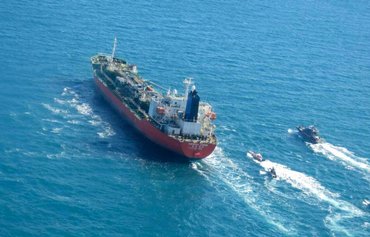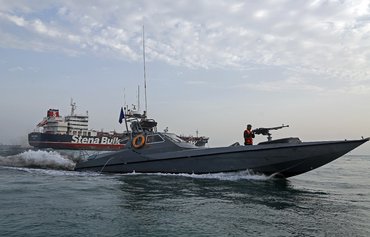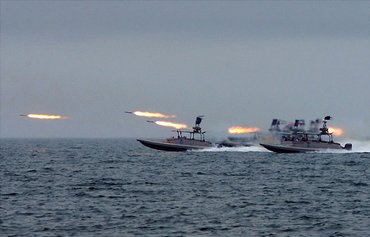The Iranian regime's shady dealings continue unabated with illicit oil smuggling and transfers, acts of piracy and money laundering operations using front companies to evade sanctions.
Iran's actions show a lack of Iranian commitment to revive the 2015 nuclear agreement, known as the Joint Comprehensive Plan of Action (JCPOA), and have exposed Iran to a slew of new sanctions by the United States, the latest of which were announced on July 6.
"Absent a commitment from Iran to return to the JCPOA, an outcome we continue to pursue, we will keep using our authorities to target Iran's exports of energy products," US Secretary of State Antony Blinken said on Twitter.
"The United States has been sincere and steadfast in pursuing a path of meaningful diplomacy to achieve a mutual return to full implementation of the Joint Comprehensive Plan of Action," he said in a separate statement.
![Iranian tankers Daran and Golroo are seen in this image discharging at the Baniyas port in Syria on June 24. Arman 114 is engaged in a ship-to-ship transfer with Traden. [European Union]](/cnmi_am/images/2022/07/11/36117-oil-transfers-iran-600_384.jpg)
Iranian tankers Daran and Golroo are seen in this image discharging at the Baniyas port in Syria on June 24. Arman 114 is engaged in a ship-to-ship transfer with Traden. [European Union]
![Iranian teachers seen protesting in an undated picture. In the past several months, Iranians have gathered to protest their dire living conditions on a near-daily basis. [Iran International]](/cnmi_am/images/2022/07/11/36147-Iran-protests-public-600_384.jpg)
Iranian teachers seen protesting in an undated picture. In the past several months, Iranians have gathered to protest their dire living conditions on a near-daily basis. [Iran International]
"It is Iran that has, to date, failed to demonstrate a similar commitment to that path," he said.
Iran's continued oil shipments to the Syrian regime, also under sanctions, are a prime example of Tehran's disregard for its commitments and for international laws.
Deceptive shipping practices
An Iranian oil tanker arrived at the Syrian port of Baniyas, the third in recent weeks, Iranian Tasnim news agency reported on July 4.
The Iranian tanker arrived at the northwestern Syrian port on the Mediterranean on July 2, following the opening of a new line of credit between the two countries, Tasnim said.
On June 24, the first two Iranian tankers -- Daran and Golroo -- unloaded their cargoes at the Baniyas port, while Iranian tanker Arman 114 was engaged in a ship-to-ship transfer with Cameroon-flagged Traden, according to a report by US-based advocacy group United Against Nuclear Iran (UANI).
In order to avoid detection of the destination of its cargo, Iran usually uses ship-to-ship transfers, in which the vessels turn off their transponders at sea and secretly transfer their oil cargo.
Data by UANI shows that Syria is the second largest importer of Iranian oil after China. The Islamic Republic delivered more than 111,000 barrels of oil per day to Syria in May for a value of more than $400 million.
However, it remains to be seen whether or how Iran is being paid for the shipments.
On July 4, Syria's official SANA news agency reported that President Bashar al-Assad had ratified a "new phase" of the credit line agreement between Damascus and Tehran.
The deal aims to provide Syria with energy and other supplies needed to make up for its shortfall, AFP reported.
Syria has been ravaged by more than a decade of civil war that has cost the hydrocarbon sector tens of billions of dollars.
In July 2015, the Syrian parliament approved an agreement with Iran, under which Syria received a $1 billion credit line.
The deal came after two similar lines of credit in 2013 worth $4.6 billion in total, allowing Iran to provide Syria's oil needs.
"Iran has pursued a wide range of deceptive practices in the shipping industry to evade international sanctions on Iranian oil products," the UANI report said.
"The regime's deceptive shipping activities compromise the safety and integrity of the international maritime industry," it said.
Acts of piracy
At the same time as it engages in deceptive shipping practices, the Islamic Republic has continued to threaten oil vessels in the Strait of Hormuz with acts of piracy.
With the current global energy crisis caused by Russia's invasion of Ukraine, the Strait of Hormuz -- a chokepoint through which a fifth of world oil output passes -- has become even more critical.
On June 20, a US Navy vessel fired a warning flare towards an Iranian military speedboat that approached it in the strait, the US Fifth Fleet said.
"Three vessels from Iran's Islamic Revolutionary Guard Corps (IRGC) Navy interacted in an unsafe and unprofessional manner as US Navy ships transited the Strait of Hormuz," said the US Navy statement.
"One of the vessels approached [USS] Sirocco head-on at a dangerously high speed and only altered course after the US patrol coastal ship issued audible warning signals to avoid collision."
"The Iranian vessel also came within 50 yards (45m) of the US Navy ship during the interaction, and Sirocco responded by deploying a warning flare," it said.
The US Navy said the incident lasted one hour and ended when the IRGC navy vessel departed the area.
Washington has repeatedly accused the IRGC of disrupting maritime traffic in the Strait of Hormuz.
The latest incident comes after the IRGC on May 27 boarded and seized two Greek-flagged oil tankers in the Gulf.
Greece condemned Tehran's detention of the two ships as "tantamount to acts of piracy".
The June 20 encounter is not the first.
In July 2019, the IRGC seized British-flagged tanker Stena Impero with its 23 crew members aboard in the Strait of Hormuz.
It was held in the Iranian port of Bandar Abbas for two months and only released after international pressure.
In January 2021, the Iranian navy seized the South Korean tanker Hankuk Chemi as it transited the Strait of Hormuz. The tanker was seized as Iran sought the release of Iranian funds frozen in South Korean banks, and was released four months later.
Domestic dissent
Iran has been able to improve its financial situation temporarily by using banking services in China and some Middle Eastern countries, among others.
In a June 22 report, the Wall Street Journal quoted Western and Iranian diplomats and officials as saying that Iran has evaded sanctions "through a network of proxy companies, foreign exchange houses and intermediaries".
Capital market expert Hassan Zamani said government-controlled Iranian entities have opened bank accounts outside Iran and set up front companies which sell Iranian oil and oil products in any possible currency.
"Iran is currently a global money laundering paradise, as it is not a member of the Financial Action Task Force (FATF)", Zamani said.
In circumventing sanctions and using profits to arm its proxy militias in Lebanon, Iraq, Syria and Yemen, the regime is impoverishing the majority of the Iranian public.
Some observers say that the regime's foreign wars and support of proxy groups are a calculated strategy to distract Iranians from protesting the dire state of affairs at home.
That strategy has clearly failed.
Inside Iran, near-daily demonstrations over the past several months have seen Iranians protest against government corruption and a host of social ills, including unpaid wages, lack of benefits, low salaries, undesirable working conditions and unemployment.
Anger toward the government has been fueled by President Ebrahim Raisi's appointment of a disproportionate number of former and current IRGC officials to most major positions in his administration.
The IRGC answers directly to Iranian leader Ali Khamenei and controls almost the entire economy.
It persecutes Iranian dissidents, trains militia elements that interfere in the region's affairs, and attempts to meddle in elections. Observers and citizens say it takes money out of the Iranian public's pockets to fund these activities.
What is not funded by the country's budget is supported by smuggling illegal drugs and illicit weapons, in which the IRGC's overseas arm, the Quds Force, and its several proxies engage.

![An Iranian flag flutters on board the Adrian Darya oil tanker, formerly known as Grace 1, off the coast of Gibraltar in 2019. [Johnny Bugeja/AFP]](/cnmi_am/images/2022/07/11/36163-000_1jm0ge-600_384.jpg)






